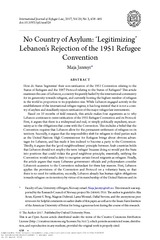| dc.description.abstract | How do States ‘legitimize’ their non-ratification of the 1951 Convention relating to the Status of Refugees and the 1967 Protocol relating to the Status of Refugees? This article examines the case of Lebanon, a country frequently hailed by the international community for its generosity towards refugees, and currently hosting the highest number of refugees in the world in proportion to its population size. While Lebanon engaged actively in the establishment of the international refugee regime, it has long insisted that it is not a country of asylum and steadfastly rejects ratification of the major refugee law instruments. Based on 10 months of field research, this article makes four arguments as to why Lebanon continues to resist ratification of the 1951 Refugee Convention and its Protocol. First, it argues that there is a widespread and real, or simply politically expedient, uncertainty as to the obligations that come with the Convention. This includes a belief that the Convention requires that Lebanon allow for the permanent settlement of refugees on its territory. Secondly, it argues that the responsibility-shift for refugees to third parties such as the United Nations High Commissioner for Refugees brings about obvious advantages for Lebanon, and has made it less inclined to become a party to the Convention. Thirdly, it argues that the ‘good-neighbourliness’ principle between Arab countries holds that Lebanon should not employ the term ‘refugee’ because doing so would put the State into positions that could violate the good neighbour principle; essentially, ratifying the Convention would entail a duty to recognize certain forced migrants as refugees. Finally, the article argues that many Lebanese government officials and policymakers consider Lebanon’s accession to the Convention redundant for three key reasons. First, Lebanon applies the provisions of the Convention and Protocol on a voluntary basis, so that there is no need for ratification; secondly, Lebanon already has human rights obligations towards refugees on its territory by virtue of its membership of the United Nations and its ratification of a number of core human rights instruments; and, thirdly, due to the ‘crisis’ in international refugee law, in which many States appear to reject the Convention altogether, Lebanese decision makers are now questioning the relevance of these instruments. | en_US |

